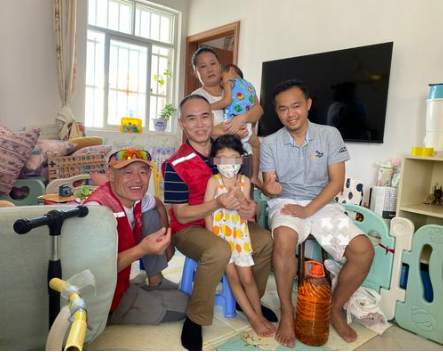Hainan Province plans to achieve zero-inherited births and zero omitted cases in thalassemia by 2030. After four months of visitation and research, Fang Ming, a thalassemia project specialist from Hainan Beatitudes Foundation, believes that as long as all parties in society work together, this goal can be achieved.
Thalassemia, an inherited blood disorder, is more common in the southern coastal areas in China, such as the Hainan Province, an area with a relatively high incidence. Mild forms of thalassemia trait don't need treatment. For intermediate and major forms, treatments normally include blood transfusions and chelation therapy to remove excess iron. Hematopoietic stem cell transplantation (HSCT), which represents the only cure for patients with thalassemia, yet often keeps patients’ families away for its prohibitive cost.
Wen Ze is 10 years old this year. When he was three months old, he was examined for his yellow skin tone in the hospital. The results showed that Wen suffered from thalassemia.
Fortunately, they have got medical care minimal assurance reimbursement, support from relatives and friends, and help from the Beijing AngelMom Charity Foundation. "Without their help, we would not be where we are today," said his mother.
According to a survey on the economic burden of thalassemia patients, for a patient from 0 to 20 years old, their family needs to spend 50,000-60,000 yuan on medical expenses every year.
After learning about HSCT (haematopoietic stem cell transplantation), Wen Ze's parents decided to perform the transplant for their child, hoping that he could be cured. But before that, there had been no successful HSCT case in Hainan.
In February 2017, Wen who was more than five years old, underwent the procedure, on which their family spent about 200,000 yuan, with some expenses partially reimbursed. Luckily, the procedure was very successful, now he doesn't need to take any medicine at all.
Thalassemia patients often face a situation of blood supply shortage for which they can’t get treatment. It happened to Wen when he was little, therefore, his parents and one aunt had volunteered to donate blood. They had also asked for help from people living in the same village, even being willing to pay them to donate blood. Yet, due to their lack of awareness of blood donation, these people often refused to do it. Later, at the blood donation station, his mother said that Wen needed stable blood transfusions, hoping to get help. A blood donor happened to hear it, saying that they would donate to him.
There are nearly 800 registered thalassemia patients in Hainan Province, including mild, intermediate, and major forms, 508 of which currently need blood transfusions.
According to incomplete statistics, so far, 141 HSCT procedures have been performed in Hainan Province, of which 140 were successful.
Another patient with severe beta-thalassemia, Song Yuran (pseudonym), is 15 years old. When Yuran was little, the mother tried to boost her child's immunity with a healthy diet and lifestyle, including going to bed early every day and soaking his feet in hot water to treat sinusitis. At present, Yu Ran has the symptoms of an enlarged liver and spleen, and a mild iron overload, for which two iron-removing drugs should be used together to quickly excrete excess iron. In addition to conservative treatment, Song's mother is also waiting for gene therapy, hoping to bring more hope to her child.
Hainan Beatitude Foundation (HBF) currently promotes care for children with thalassemia as the key project. As the project specialist, Fang Ming visits the families of children with thalassemia every week in Hainan, providing living materials to families in need, helping children who are undergoing treatment, and also participating in blood donation, and proposing blood donation initiatives.
"I joined the thalassemia project four months ago on April 28..." Fang said.
However, after Fang started leading the project, in May and June, he cried several times. Some parents thought he was a fraud trying to sell medicines to them. Once, on their way to some activities outside of Hainan, after learning that he was working on a thalassemia project Fang Ming’s friend asked: Are you nuts? Such projects won’t make money. Why do you do it...
During the visits, the living situation of the thalassemia children and their families touched his heart. One family especially has financial difficulties. The husband, blind, and the wife suffering from polio, are both in their 30s. Their two boys both have thalassemia and the grandfather is paralyzed. Only the grandmother raises pigs to support the family which also receives a monthly subsistence allowance of 1,200 yuan. "If the husband has the opportunity to learn massage skills, he can earn two or three thousand yuan per month to support his family. But without anyone teaching him, he will not be able to provide for the family. In this case, what would happen to the two children?" Fang feels very worried after learning about it.
A few days ago, when visiting a family with a thalassemia patient, he found that the child was severely anemic, so he urged the parents to take the child to the hospital quickly. At the hospital, the test result showed that the patient’s hemoglobin was only 29g/L, which meant that the child might have a life-threatening cardiac arrest in two or three days without proper medical care.
According to medical procedures, men with hemoglobin below 90g/L must have blood transfusions. The Provincial Blood Center has made an unwritten rule due to blood supply shortage, that children with thalassemia can only have blood transfusions if their hemoglobin is lower than 60g/L.
Before knowing people with thalassemia, Fang had been an active blood donor, having donated blood nearly 40 times for free. During the epidemic, blood supplies were extremely scarce. Then, he went to donate blood on August 30, calling on those who could do the same to donate blood once on his Wechat Moments.
It is reported that the thalassemia gene itself is not bad. In tropical and subtropical climates, the thalassemia gene is an inherited protective mechanism that protects people from malaria to some extent. But if both husband and wife carry the same type of thalassemia gene, it is possible to have a child with thalassemia major. As long as the encounter between two thalassemia genes of the same type is avoided, the birth of thalassemia children can be prevented.
Most families with thalassemia patients are socially disadvantaged groups, lacking medical knowledge and awareness of pre-pregnancy and prenatal examinations.
Fang Ming and volunteers plan to organize medical experts to help rural grassroots doctors know better about thalassemia, so as to help rural women of childbearing age have early examinations and awareness, reducing the birth of thalassemia children.
- Translated by Shuya Wang












